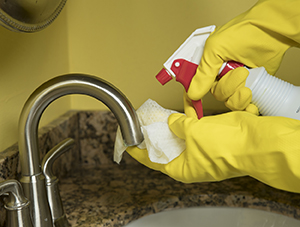Controlling Allergens: Mold
Controlling Allergens: Mold

Constant exposure to allergens means constant allergy symptoms. That's why controlling or staying away from the allergens that cause your symptoms is an important part of your treatment. If you are allergic to mold, the tips below may help reduce your exposure.
Mold allergy
Mold allergy is actually from the spores that the molds release. Spores are microscopic seed particles that travel through the air. Molds grow best in dark, damp places. Outside, mold grows on rotting logs, wet leaves, certain grasses, and weeds. In the home, mold often grows in or on the following:
-
Damp basements and closets
-
Bathrooms (especially shower stalls)
-
Places where fresh food is stored
-
Refrigerator drip trays
-
House plants
-
Air conditioners
-
Humidifiers
-
Garbage cans or waste baskets
-
Mattresses
-
Upholstered furniture
-
Old foam rubber pillows
-
Walls or other home structures if there has been water damage from a flood or leak. You may not be able to see mold in walls.
Controlling mold
Try the following:
-
Check your local news for outdoor mold spore counts. When they are high, stay inside as much as possible.
-
Drain wet areas of your yard. And clean up leaves and weeds before they begin to rot. If you compost, keep compost piles away from the house. Ask someone else to do these things for you.
-
If you are outside when mold counts are high, bathe, wash your hair, and change your clothes afterwards.
-
Use products with bleach to clean the shower or tub. Also clean the shower curtain.
-
Fix leaky faucets or leaks in the roof right away.
-
While bathing or showering, leave a window open or use a fan. Leave the shower stall and bathroom door open after bathing to help it air out.
-
If your house is damp, use a dehumidifier. Empty once a day.
- If you have water damage in your house, have a professional clean up the damp areas and fix the leaks as soon as possible. Painting over a water damaged area may conceal the mold. But it won't get rid of it.
Updated:
April 15, 2019
Reviewed By:
Deborah Pedersen MD,Marianne Fraser MSN RN,Daphne Pierce-Smith RN MSN CCRC